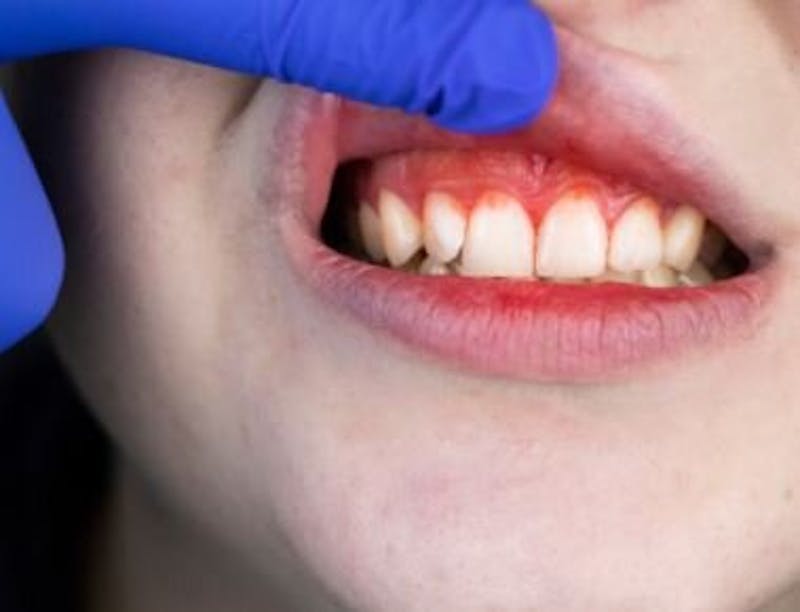
Over 47% of adults over 30 are living with some form of periodontal disease (also known as gum disease), and some are turning to a novel treatment option: cannabidiol (CBD). CBD is a non-psychoactive compound found in the cannabis plant, and it’s being researched as a potential remedy for everything from anxiety to epilepsy to chronic pain.
So what does the research say about CBD oil for gum disease?
Potential Benefits of CBD for Your Gums
Gum disease is an infection of the gums that occurs when plaque accumulates around the teeth and is fueled by the bacteria that live in the mouth. To prevent and reverse gum disease, you have to get the plaque and the bacteria under control. CBD may provide some help here.
We don’t yet fully understand the benefits—or lack thereof—of taking CBD oil for gum disease, but we do have a growing number of clinical studies that show promise. While CBD won’t likely cure gum disease, it may help with certain symptoms and effects. For instance:
-
CBD has been shown to have anti-inflammatory properties
-
CBD has been shown to have pain-inhibiting properties
-
CBD has been shown to have antibacterial and antiseptic properties
-
CBD has been shown to reduce plaque colonies
-
CBD has been shown to help with anxiety
Let’s look at how each of these research areas relates to gum disease.
Anti-Inflammatory Properties of CBD
Multiple studies have attested to the inflammatory potential of CBD. One study in particular examined the impact of cannabidiol on rats with joint inflammation. The researchers concluded that topically applied CBD was able to reduce the rats’ pain and joint swelling without significant side effects.
While much of the research is focused on general inflammation and not on gum disease in particular, the results may have relevant implications. For instance, the anti-inflammatory qualities of CBD oil may be useful for addressing minor tooth decay, toothaches, tooth sensitivity, and swollen gums—all of which can be caused or exacerbated by inflammation.
It’s also important to note that gum inflammation doesn’t just affect the mouth. Bacteria in the gums can seep into the blood supply and cause inflammation in remote parts of the body, including the heart. So the anti-inflammatory effects of CBD may soothe more than just the gums and teeth.
CBD May Inhibit Pain

Cannabidiol has shown the ability to block pain signals to the brain, providing relief from various aches and pains.
A toothache is commonly caused by inflammation originating in the pulp inside the tooth. While the anti-inflammatory qualities of CBD might help to address this, the general pain-fighting characteristics of cannabidiol may provide additional relief.
Studies have shown that cannabidiol may be effective not only for reducing inflammation but for blocking pain signals to the brain. In a review of 18 major trials conducted on the topic of CBD and other cannabinoids for pain, 15 of the trials demonstrated significant analgesic effects when compared to placebo.
While many of these trials focused on the full spectrum of cannabinoids (cannabis compounds) and not just CBD, the results are nevertheless noteworthy as many CBD oil products contain most or all of the major cannabinoids working in concert.
In addition, other studies have shown that CBD on its own may be helpful for chronic and intractable pain. This cannabinoid appears to increase the release and bioavailability of natural pain mediators like serotonin.
In other words, if you’re experiencing toothaches as a result of gum disease, CBD oil may provide some relief.
CBD Fights Bad Bacteria in the Gums

A growing body of research reveals that cannabidiol may be a natural antibiotic. Studies have shown that CBD fights even highly resistant bacteria like Staphylococcus aureus, Streptococcus pneumoniae, and Clostridioides difficile. CBD may also weaken and kill a range of microorganisms in addition to common bacteria, which could mean good things for gum disease sufferers.
Dentists commonly prescribe antibiotics to fight the bacteria responsible for gum disease. While this type of treatment usually needs to be complemented with scaling, root planing, and other procedures, the antibiotics alone can go a long way toward slowing and helping to reverse gingivitis and more serious periodontal diseases.
Some studies have gone so far as to declare CBD as effective as tetracycline, azithromycin, and other leading antibiotics, though more research is needed. If additional studies reveal the same promise, CBD may ultimately be recognized as a new class of antibiotics.
CBD Could Reduce Plaque Colonies
As previously noted, oral bacteria feed off of plaque inside the mouth. Without the presence of plaque, the bacteria can’t trigger the infections that lead to gum disease. That’s why so many toothpastes emphasize their plaque-fighting capabilities.
One study specifically looked at the effects of cannabidiol and other substances on oral plaque colonies in laboratory dishes. The study’s author concluded that CBD was able to destroy plaque more effectively than many major types of toothpaste.
It’s important to note that the author of the study is the founder of a company that advocates for medical cannabis in dentistry. However, her company’s own natural toothpaste was outperformed by CBD in the study.
CBD May Help With Dental Anxiety
Several studies, including one control study from Brazil, have demonstrated the potential for CBD to address anxiety. The Brazilian study included 57 men, each of whom was given 300mg of oral CBD or a placebo prior to a public speaking event. The CBD resulted in a significant reduction in anxiety while the placebo had no effect.
The reason for CBD’s anti-anxiety effect could be similar to the reason for its pain-fighting effect. Interactions with the body’s endocannabinoid system can alter the behavior of the brain’s neurotransmitters (like serotonin and dopamine). Some of the same neurotransmitters responsible for quelling pain are also responsible for easing anxiety.
While more courage won’t necessarily reverse gum disease, it might make it easier for fearful patients to seek out the treatment they need with a licensed, experienced dentist. By taking a dose of CBD prior to an appointment, the patient may feel more at ease and able to manage the apprehension associated with major dental work.
How to Use CBD Oil for Gum Disease
There are many ways to take CBD oil: tinctures, gummies, topicals, and even teas. The classic, familiar CBD oil comes in the form of a tincture: Just place a couple of drops under the tongue and let the oil absorb into the bloodstream.
Still, the optimal dosage and delivery system may depend on what you’re trying to achieve.
Best Way to Use CBD to Treat Inflamed Gums
While any oral CBD product may provide some level of pain, anxiety, or inflammation relief, not every delivery system is ideal for localized treatment (e.g. gum disease). Your best bet is to start an oral care regimen using CBD toothpaste & mouthwash.
One study even concluded that CBD mouthwash may be as effective as a prescription oral rinse for killing bacteria. While the research was industry-sponsored, it reinforces much of what we already know about the antiseptic and antibacterial properties of CBD.
Best of all, the process is as simple as replacing your existing toothpaste and mouthwash with the CBD variety. Use twice daily.
If you can’t access CBD toothpaste and mouthwash, you can purchase standard CBD oil and add a couple of drops to your regular toothpaste and to your tea. This may help you to achieve some of the same antiseptic benefits.
How to Use CBD for Dental Phobia
If you’re just nervous about your upcoming appointment and you want to put your mind at ease, opt for a CBD delivery system that goes right to the bloodstream. In this case, a tincture might actually be your best bet.
Everyone responds to different dosages, but the general recommendation is to take 1.5mg of CBD oil for every 10 pounds you weigh. So if you weigh 150 pounds, you might start with a dosage of 22.5mg and adjust up or down as needed.
Take one dose the night before your appointment, and then take another dose the morning of your appointment. This is especially important if you’re new to CBD, as the compound won’t be as effective the first time you use it. The first dose is known as the loading dose, as it takes time for the CBD to build up in your fat cells.
RELATED READING: 5 Expert Tips for How to Get Over Your Dental Phobia
Can CBD Oil Cure Gum Disease?
There is no substitute for professional dental care, particularly when it comes to serious conditions like gum disease. If not properly treated, gum disease can cause severe pain, bleeding gums, and even tooth loss, so it’s important to act quickly and seek out the assistance of a trained professional.
With that said, CBD may help to:
-
Slow the progression of gum disease
-
Reverse some of the effects of gum disease
-
Relieve some pain and inflammation associated with gum disease
-
Ease your anxiety when you do visit the dentist
While we’re still working to understand the role of cannabidiol in oral care, the outlook is mostly positive so far. CBD appears to impact the oral microbiome in a good way, and when you consider that it’s well-tolerated by most people, there’s no reason not to incorporate it into your oral care routine. Think of it as a complement to your gum disease treatment, and not a replacement for complete dental care.
If you have other specific questions, our Beverly Hills periodontal services specialize in fixing sensitive gums. We can help with both minor and severe gum disease. Get in touch today for more information.
